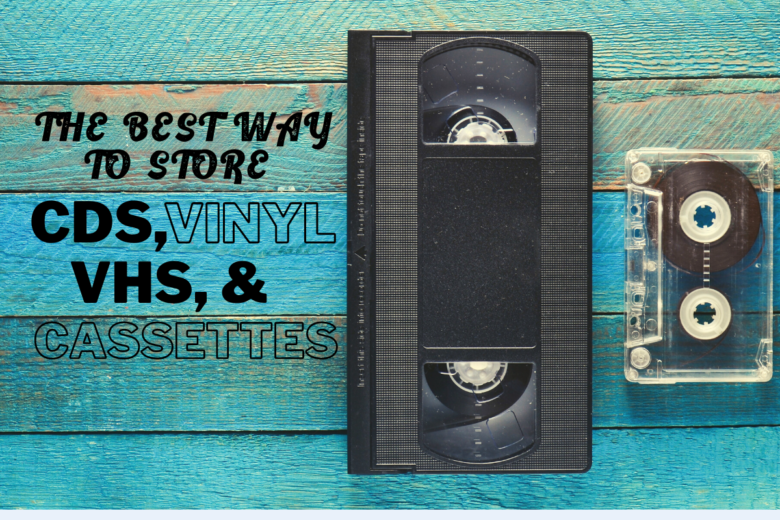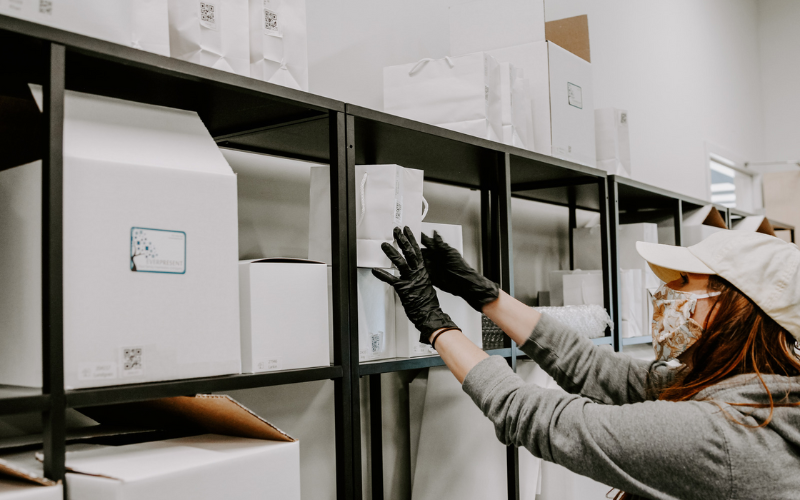How to Properly Store Records and Other Vintage Media: Best Practices
Many people think that vinyl records, cassettes, VHS, and laser discs are a thing of the past, but that is far from the case.
Valued for their vintage aesthetic, collectors, stores, and individuals are constantly adding vinyl and other older media to their collections for personal and commercial use.

If you have records and other vintage media lying around your house, it is vital that you properly store them. They are delicate and susceptible to environmental damage.
If you have an extensive collection of vinyl records, you are familiar with the difficulties of storing them. Some people hold onto them for their emotional significance. Others have made collecting them a hobby. No matter the reason, this guide will cover how to properly store records and other retro media so they are preserved correctly.
Why is it Important to Store Records?
Vinyl records, cassettes, and other old media are delicate. They require special attention to maintain their quality and last. Here are the most important reasons to store your records properly:
Long-Term Use
The storage system for any media can affect its longevity. Some of these records hold childhood memories, while others contain personal artwork. You may lose your favorite cassettes, VHS, laser discs, and vinyl if they are not stored properly.
Prevent Warping
Records are sensitive and fragile. Environmental factors can affect them and change the quality of the content within. Heat can be one of the most damaging factors. CDs and laser discs, exposed to heat for a long time, result in warping. Additionally, video tapes can develop playback problems due to heat exposure. Keep this media away from the heat to preserve them correctly.

Avoid Color Fading
What happens when you leave your vinyl record in direct sunlight? They lose their color. While warping is a problem associated with heat, fading is the result of UV radiation. If you do not store the records away from light, you will have a highly faded, black-and-white sequence in place of vibrant colors. This damage affects the interior as well as the cover of the records.
Inhibit Mold Growth
Moisture affects your collectibles like any other valuable thing in your home. Mold and mildew do not discriminate. They can quickly grow on the records and destroy them. In severe cases, the records’ content is lost and can’t be recovered.

Avoid Breakage
If you thought the heat was your only problem, think again. Records need to be preserved in a consistent setting. If you move the records from excessive heat to a cool environment, you will witness critical damage. Additionally, videotapes, cassettes, and vinyl get brittle in cold temperatures. They are best preserved in a climate-controlled environment.
Avert Pressure
If you have records in your home that have been improperly stored, you’ve likely seen them stuck together. This is not just a short-term problem. Such situations lead to warping. If you like to stack your records on top of each other, you are subjecting them to significant damage. Laserdiscs and vinyl records cannot bear pressure.

How to Store CDs and Records Properly
If you want to hold onto your vintage media, it is vital to learn the best way to store CDs, laser discs, and vinyl records to maintain their value and integrity.
Now that you understand the importance of storing older media correctly, it’s critical to know how to do it.
Ideal Temperature
If you have your collectibles and memorabilia in your attic, loft, or shed, you must have encountered various forms of damage. The garages and attics are warmer than the rest of your house. Storing your valuable records in these areas results in warping. According to the Northeast Document Conservation Center, the ideal temperature to store records is around 50–60 degrees Fahrenheit for long-term use. You can reduce the temperature by five degrees, but that’s the most flexible you can get. It goes without saying, but you should avoid storing the records near radiators, air conditioners, heaters, or vents.

Ideal Humidity
Do you know how antique stores have perfectly preserved records? According to various sources, about 30–45% relative humidity can make the records last for 100 years or more. Closed containers with stuffed records develop stubborn films of mold. You must ensure that cassette storage boxes have proper air circulation. Additionally, when it comes to vinyl and CD storage, you should keep differently-sized records apart. In the case of similar sizes, make sure to leave some gaps for better circulation.
Stacking Position
Horizontal stacking adds pressure layer by layer. It is not the best way to store CDs and records. The primary step is to get a sturdy vinyl, CD, or cassette tape storage box. Bonus points if you place your vinyl, CDs, and cassette tapes in storage units that are climate controlled.
Once your boxes are ready, place the records upright, in a vertical position. It is easy to forget to leave enough space to go through these records later. If you fill the VHS storage box compartments up to their capacity, you can break these records trying to get them out. You should avoid exerting too much pressure on individual records, even in a vertical position.
Extra Layer of Security
If we’re covering the best ways to store records, we cannot forget sleeves. Based on their usage, there are two kinds of sleeves available in the market: inner and outer. Inner sleeves have the most intimate contact with your records, making them vital. On the other hand, outer sleeves are used to protect the artwork. Modern records use paper sleeves, but they leave paper flake residue. Removing these flakes from your record can be as annoying as removing lint from your sweater. Invest in polyethylene-based inner sleeves to prevent the flake situation and static build-up.

How to Properly Store Records: Essential Tips
Scratched, bent, and damaged records do not play well. They lose their aesthetic appeal and the quality of the audio. Even when you know the best way of storing vinyl records, here are a few tips that may come in handy.
- A thumb rule: Remember this formula: 50–60 F, 30–40 H. It means 50–60 degrees Fahrenheit and 30–40% relative humidity. That is why you should always keep your records indoors (but not in the attic or garage). The best thing is avoiding extremes; too hot, too cold, and too humid are all no-goes. Dirt and dust are stubborn culprits too.
- Tip from the museum: Protective sleeves are used to protect vinyl records in museums and antique stores. Laserdisc and vinyl records have fragile cardboard covers that cannot sustain the wear and tear of time. Hence, they become more vulnerable.
- Cleanliness is the priority: Cleaning records before putting them in their sleeves or jackets are essential. Always use a cleaning brush instead of regular cloth or paper towels. If you are not a fan of brushes or do not want to spend on one, you can use a microfiber cloth.
- Material quality: The sleeves can be made of different materials. PVC-based outer sleeves are more damaging than protective. Vinyl and PVC are oil-based. With time, they may combine, thereby hampering the integrity and value of the records. Polypropylene or polyethylene are the best materials, with polypropylene being ideal for crystal-clear visibility.
- No-touching rule: Be sure you do not touch the records when taking them out. Everything but the edges is off-ground. This ensures that you don’t transfer oils from your hand onto the records.
- Temperature control: A climate-controlled storage unit is the best place to store vintage media, particularly vinyl and VHS tapes.
- Identify the concerns: If the temperature exceeds 130 degrees, you should be prepared to move your record treasures to a safe place. Besides, the production of mist or the hissing sound on records is a signal for trouble. This sound means that the outer sleeve has some oil-based product and is merging with your records.
- Hire professionals for moving: Records are always at risk of damage. So, when you are planning to move or transfer a massive stack of your favorite collectibles to someplace new, don’t DIY it. Take help from professionals and let them take care of your collection.

Preserve Your Media with EverPresent
Listening to your favorite vinyl records and other vintage media allows you to walk down memory lane. Learning to store these records correctly is the first step in the preservation process. If you have been collecting records for a long time, you know how valuable some items can be. Some of the cassettes and videotapes you own are the only copies left. Improper care can significantly reduce their quality and, in some cases, destroy them.
While keeping up with the maintenance of these items can seem stressful, you don’t have to worry about improper storage of your old media again when you choose EverPresent.
We care about your memories and have the experience to bring your favorite media back to life. Whether you need to convert cassette to digital or film to digital, EverPresent can help you every step of the way.
Visit our site today to learn more about preserving your media with expert digitizing.


